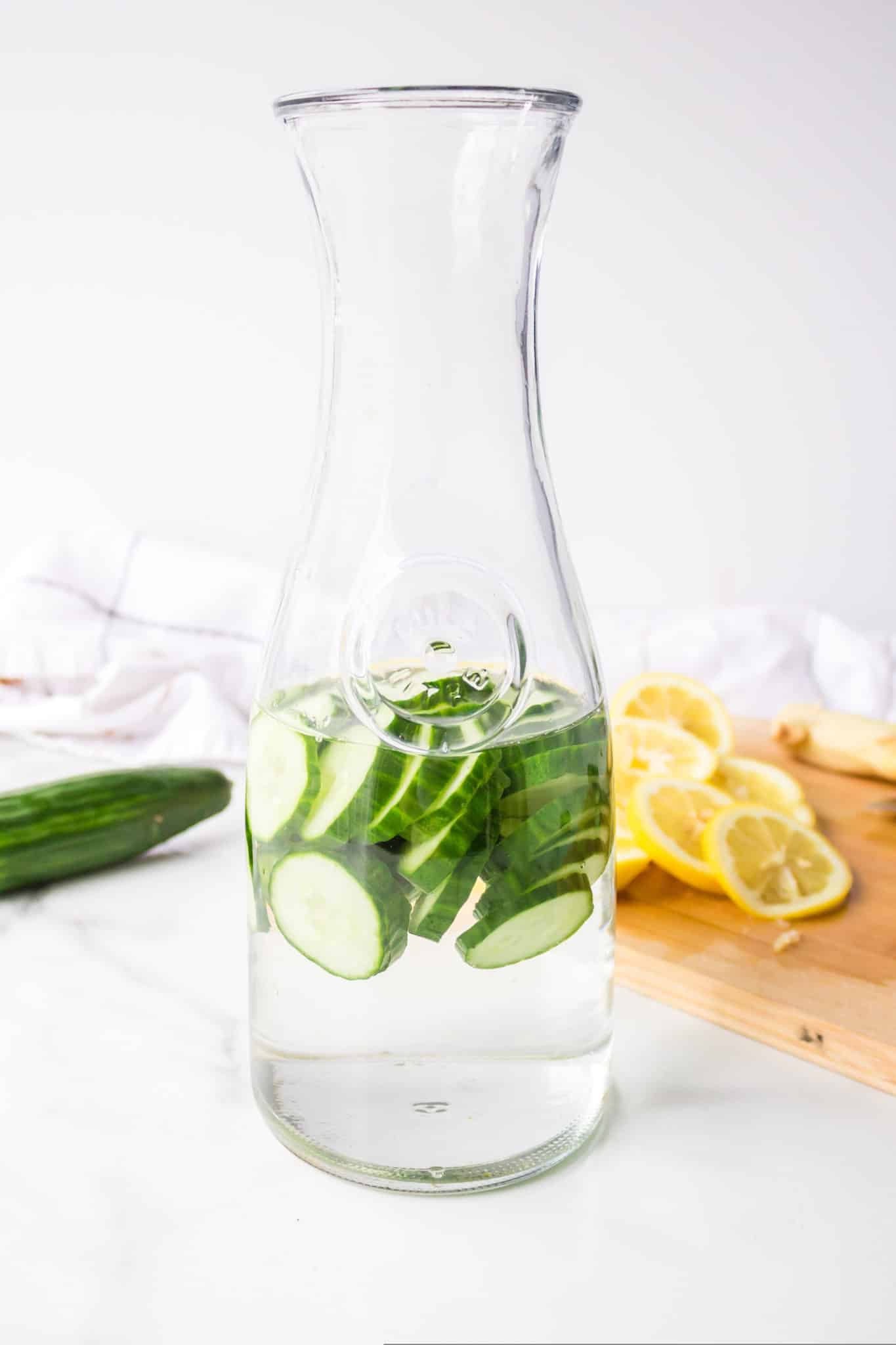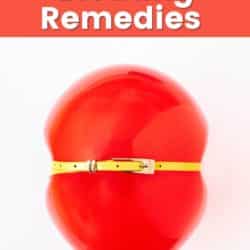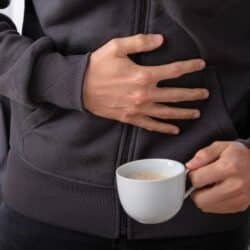9 Natural Perimenopause Bloating Remedies
Perimenopause is the time in a woman’s life when we are still cycling, but our hormones start changing as we move toward menopause. These fluctuating hormones can lead to symptoms including bloating, fatigue, digestive issues, and more. This article includes 9 natural perimenopause bloating remedies.

What Happens During Perimenopause?
Estrogen levels can be higher in early perimenopause than normal. As a woman gets closer to her final menstrual cycle, then estrogen levels that are part of normal female sex hormones may start to be lower than normal.
These fluctuations in estrogen are likely part of the root cause of unpleasant symptoms including tummy weight gain, vaginal dryness, hot flashes, mood swings, night sweats, more frequent migraines, low energy, brain fog, and more.
Excess estrogen may also cause water retention or fluid retention which accounts for some of the bloating symptoms.
Many women also report changes in digestion during perimenopause and menopause including constipation, bloating, and changes in food sensitivities.
While most bloating is not necessarily dangerous or cause for medical concern, it’s important to talk to your doctor or healthcare provider if it last longer than a few weeks.
What Bloating Feels Like
Bloating related to hormonal changes such as during perimenopause or menopause most often is related to a feeling in the stomach or abdominal area.
Many women complain that hormonal or perimenopause bloating feels as if the stomach is hard, puffy, or filled with air.
Bloating can also feel uncomfortable in other parts of the body, including the face, ankles, and hands. Bloating in any area is uncomfortable and can reduce one’s quality of life and self-confidence.
The natural bloating remedies included in this article may be effective in helping with symptoms of fullness in the abdomen. But, of course, please be sure to check with your doctor if the bloating doesn’t improve after a few weeks.
And, try to avoid over-the-counter medications including laxatives which are not safe for long-term use.
Natural Bloating Remedies
To help manage the natural digestive changes that occur during perimenopause, here are 9 natural remedies that may help.
The good news is that these relatively simple lifestyle changes can often make a big impact in reducing perimenopausal or menopausal bloating and other symptoms of menopause.
1. Increase your water intake
Staying hydrated is really important for digestive health. Water helps move things along and can help prevent constipation, especially if your digestion or metabolism slows down during perimenopause or menopause.
There isn’t one ideal amount of water to drink per day, but you should monitor the color of your urine.
If it is dark yellow, then you are likely not drinking enough water or fluids (although some vitamins or supplements including B vitamins may cause your urine to turn a bright yellow).
If you aren’t a big fan of drinking plain water, try an infused water like my Cucumber Ginger Lemon Water or Lemon Cinnamon Water. Or, try these round-ups of the best juices for bloating or the best smoothie recipes for belly fat which may also help.
Skip the diet colas as they contain artificial sweeteners that are not generally part of a healthy diet.
You may also like my Green Anti-Bloat Juice recipe.

2. Reduce caffeine
Caffeinated beverages including coffee or teas may cause water retention.
If you find yourself drinking more than several servings of caffeine per day, it’s worth cutting back and seeing if that helps reduce bloating.
See my related articles on the best decaf drinks at Starbuck’s and the best organic decaf coffee brands. Or, try making my Herbal Coffee recipe that is naturally made without caffeine.
3. Reduce salt in your diet
Salt is a known retainer of water, and eating too much salt will cause your body to hold onto extra water. Most excess salt (also called sodium) in the diet comes from packaged or restaurant foods.
So, while you do need some salt in your diet, you may try cutting back on packaged foods or restaurant meals to help your body get rid of any excess water retention.
4. Avoid foods that cause gas including onions, garlic and legumes
As hormones start changing in perimenopause, food sensitivities and allergies can show up.
Estrogen levels are tied to histamine levels in our bodies and can lead to an increase in symptoms such as sneezing, digestive issues such as irritable bowel syndrome, skin issues, and more.
Learn more about a low histamine diet.
You may find that your stomach and digestive tract feel more bloated after eating foods that contain a lot of of fiber or non-digestible starches. Try pressure cooking your beans to see if that helps, or just avoid them altogether. You may also want to cut out onions and garlic for awhile to see if the bloating diminishes.
Other tips for ensuring that you are digesting your food well include taking a probiotic to increase your good bacteria in the digestive system, eating more foods with natural probiotics, or eating more gut healing foods.
5. Ensure enough activity including walking and stretching
One of the most frustrating aspect of perimenopause is that it happens often at the height of our careers and busy lives.
Since perimenopause is often a 7-10 year process, it most certainly can come at times when we are very busy and don’t have a lot of free time.
Nonetheless, it’s so important to prioritize daily physical activity including aerobic exercise. You don’t have to necessarily spend hours at a gym or do high-intensity training, but at least 30 minutes of daily walking, yoga, or stretching is very important.
Our bodies are meant to move on a daily basis, and that movement helps with digestion, flexibility, and even mental health. For exercise specific to help reduce bloating, look for videos on YouTube that are identified as “core work.”
Getting enough exercise can also help prevent heart disease and menopause weight gain, in addition to helping to reduce bloating and menopause joint pain.

6. Monitor food sensitivities including gluten and dairy
One of the hallmarks of perimenopause is fluctuating levels of estrogen. Since estrogen is so tied to histamine levels in our bodies, this means that we can experience more food sensitivities (and other types of allergies) during this time.
Consider going on an elimination diet including cutting out foods like dairy, gluten, and soy to see if that helps reduce bloating and other unpleasant symptoms such as hives, brain fog, or seasonal allergies. You may also have developed lactose intolerance to dairy products as part of your menopausal symptoms.
See my related tips on starting a gluten-free and dairy-free diet.
For women who are in early stages of perimenopause with higher than normal levels of estrogen, you may also consider these natural techniques to reduce estrogen dominance.
7. Increase self-care and stress management. Focus on breathing techniques
Stress can no doubt lead to bloating, body tension, headaches, and many other symptoms. It’s more important than ever to try and practice self-care when you’re experiencing health challenges.
Bloating may be just one symptom of many that can be relieved with stress management techniques. To start, try spending five minutes seated in relaxation. You can listen to music or a guided meditation to help keep your mind from racing.
Over time, these practices of relaxation will become routine and can help manage stress-related issues and reduce cortisol, the stress hormone.

8. Decrease the size of your meals
Instead of eating three big meals, consider eating three smaller meals and two or three snacks throughout the day. The smaller amount of food going through your digestive tract may help reduce bloating after meals.
See my clean eating diet meal plan if you need more guidance and recipes. You may also want to try eating more of these progesterone-boosting foods.
You may also want to incorporate a digestive enzyme with your meals to help with digestion. I like the Pure Encapsulations Digestive Enzymes.
See my other recommendations for the best vitamins for women over 50.
9. Try peppermint or ginger tea with meals
For many women suffering from perimenopausal bloating, the worst symptoms can occur after meals.
Whether it’s slower digestion or increased food sensitivities, the tummy and gastrointestinal tract can get inflamed and bloated after meals.
Try drinking peppermint or ginger tea after meals to see if that helps reduce the bloated feeling.
See my recipe for homemade mint tea or chocolate mint tea.

FAQs About Hormonal Bloating
The duration of perimenopausal bloating varies from woman to woman. Some women may experience bloating for a few days, while others may have it for several weeks or months. In general, perimenopausal bloating tends to be temporary and should resolve on its own once the hormonal fluctuations that are causing it stabilize.
However, it is important to note that if the bloating persists for an extended period of time or is accompanied by other symptoms such as pain or discomfort, it may be a sign of an underlying medical condition. If this is the case, it is important to seek medical attention to rule out any serious health issues.
Perimenopausal bloating is a common symptom that many women experience during the transition to menopause. While bloating itself is not a direct cause of weight gain, it can make you feel heavier and more uncomfortable. Try the recommendations above to see if they help reduce your symptoms of bloating.
Perimenopausal bloating is often accompanied by other symptoms such as mood swings, hot flashes, and irregular periods. Bloating caused by other factors may be accompanied by different symptoms depending on the underlying cause.
If you are experiencing persistent or severe bloating, it is important to speak with your healthcare provider. They can help you determine the underlying cause of your symptoms and develop a treatment plan to manage them.
More Articles About Women’s Hormones That You Might Like
- How to Eat for Your Cycle: Four Phases
- Broccoli Sprout Powder (Benefits & How to Use)
- Best Supplements to Reduce Estrogen Dominance
- Six Lab Tests You Need (& How to Order Without a Doctor)
- Clean Eating for Weight Loss
Or, see all my articles on Women’s Health.
Don’t Miss These Helpful Resources
Perimenopause Bloating Conclusions
Hormonal-related bloating can be uncomfortable and unpleasant. This article includes several natural remedies that may help relieve bloating related to perimenopause or other female hormone changes.
Don’t forget to join my newsletter list to get exclusive clean eating recipes and tips. The newsletter is 100% free with no spam; unsubscribe anytime.
About the Author: Carrie Forrest has a master’s degree in public health with a specialty in nutrition. She is a top wellness and food blogger with over 5 million annual visitors to her site. Carrie has an incredible story of recovery from chronic illness and is passionate about helping other women transform their health. Send Carrie a message through her contact form.
Note: this post is for informational purposes only and is not intended as medical advice. Please consult your healthcare provider for recommendations related to your individual situation.























